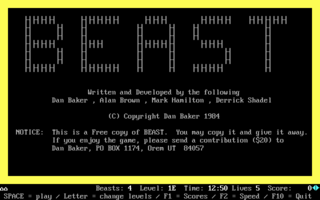 W
WBeast is a text-based action game developed for MS-DOS by Dan Baker, Alan Brown, Mark Hamilton, and Derrick Shadel. It was distributed as shareware in 1984.
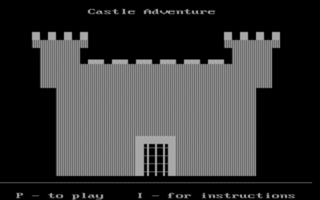 W
WCastle Adventure is a freeware adventure game designed by Kevin Bales and originally released in 1984. It was also illegally included in Keypunch's Swords and Sorcery under the title Golden Wombat. It is compiled from Microsoft BASIC; however the source has never been released.
 W
WCatChum is a text-only clone of Pac-Man written for the CP/M operating system and made to be operated on the early Kaypro line of luggable computers.
 W
WCaves of Qud is an early access roguelike role-playing video game set in an open world that is partially pre-made and partially randomly generated. The game takes place in a post-apocalyptic science fantasy setting and is inspired by the pen-and-paper role-playing games Gamma World and Dungeons & Dragons.
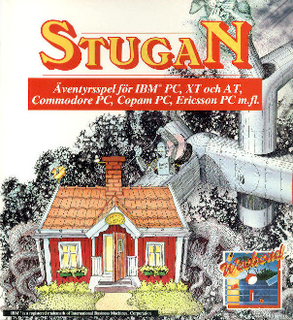 W
WThe Cottage is an adventure video game that was initially made available in 1978 for the DEC-10 mainframe computer Oden in Stockholm, and later published by Scandinavian PC Systems for IBM PCs in 1986 in Swedish, Danish, Norwegian and English. It was the first publicly available Swedish adventure game and one of the first commercial Swedish video games.
 W
WDukedom is a turn-based strategy text-based video game about land management and was created as an expanded version of Hamurabi.
 W
WEmpire is a 1977 turn-based wargame with simple rules. The game was conceived by Walter Bright starting in 1971, based on various war movies and board games, notably Battle of Britain and Risk. The game was ported to many platforms in the 1970s and 80s. Several commercial versions were also released, often adding basic graphics to the originally text-based user interface. The basic gameplay is strongly reminiscent of several later games, notably Civilization, which was partly inspired by Empire.
 W
WHamurabi is a text-based strategy video game of land and resource management. It was first developed under the name King of Sumeria or The Sumer Game by Doug Dyment in 1968 at Digital Equipment Corporation as a computer game for fellow employee Richard Merrill's newly invented FOCAL programming language.
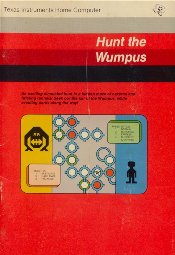 W
WHunt the Wumpus is a text-based adventure game developed by Gregory Yob in 1973. In the game, the player moves through a series of connected caves, arranged as the vertices of a dodecahedron, as they hunt a monster named the Wumpus. The turn-based game has the player trying to avoid fatal bottomless pits and "super bats" that will move them around the cave system; the goal is to fire one of their "crooked arrows" through the caves to kill the Wumpus. Yob created the game in early 1973 due to his annoyance at the multiple hide-and-seek games set in caves in a grid pattern, and it and multiple variations were sold via mail order by Yob and the People's Computer Company. The source code to the game was published in Creative Computing in 1975 and republished in The Best of Creative Computing the following year.
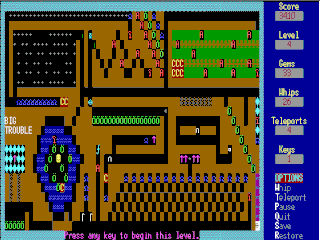 W
WKroz is a series of Roguelike video games created by Scott Miller for IBM PC compatibles. The first episode in the series, Kingdom of Kroz, was released in 1987 as Apogee Software's first game. It was also published on Big Blue Disk #20. Kroz introduced the scheme of the first episode being free and charging money for additional episodes; a technique which defined the business model for Apogee and was adopted by other MS-DOS shareware publishers.
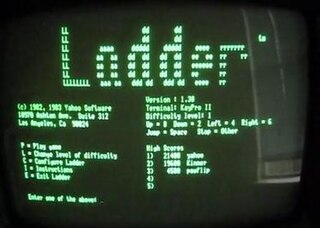 W
WLadder is a barrel-jumping game like Donkey Kong written for the CP/M operating system and made to be operated on the early Kaypro line of luggable computers. Ladder was written by Yahoo Software of Los Angeles, California.
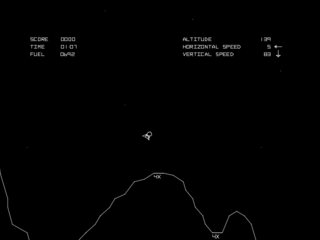 W
WLunar Lander is a genre of video games loosely based on the 1969 landing of the Apollo Lunar Module on the Moon. In Lunar Lander games, players generally control a spacecraft as it falls toward the surface of the Moon or other astronomical body, using thrusters to slow the ship's descent and control its horizontal motion to reach a safe landing area. Crashing into obstacles, hitting the surface at too high a velocity, or running out of fuel all result in failure. In some games in the genre, the ship's orientation must be adjusted as well as its horizontal and vertical velocities.
 W
WMugwump is an early video game where the user is tasked with finding "Mugwumps" randomly hidden on a 10×10 grid. It is a text-based game written in BASIC.
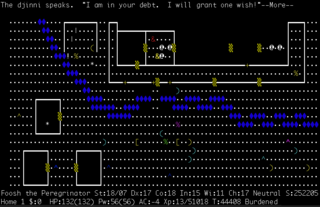 W
WNetHack is an open source single-player roguelike video game, first released in 1987 and maintained by the NetHack DevTeam. The game is a software fork of the 1982 game Hack, itself inspired by the 1980 game Rogue. The player takes the role as one of several pre-defined character classes to descend through multiple dungeon floors, fighting monsters and collecting treasure, to recover the "Amulet of Yendor" at the lowest floor and then escape. As a traditional roguelike, NetHack features procedural-generated dungeons and treasure, hack and slash combat, tile-based gameplay, and permadeath, forcing the player to restart anew should their character die. While Rogue, Hack and other earlier roguelikes stayed true to a high fantasy setting, NetHack introduced humorous and anachronistic elements over time, including popular cultural reference to works such as Discworld and Raiders of the Lost Ark.
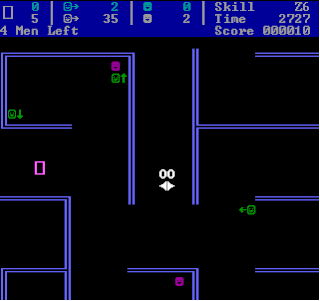 W
WSnipes is a text-mode networked computer game that was created in 1983 by SuperSet Software. Snipes is officially credited as being the original inspiration for NetWars. It was one of the earliest text mode multi player games, running on Novell NetWare systems.
 W
WSnipes is a text-mode networked computer game that was created in 1983 by SuperSet Software. Snipes is officially credited as being the original inspiration for NetWars. It was one of the earliest text mode multi player games, running on Novell NetWare systems.
 W
WThe Oregon Trail is a text-based strategy video game developed by Don Rawitsch, Bill Heinemann, and Paul Dillenberger in 1971 and produced by the Minnesota Educational Computing Consortium (MECC) beginning in 1975. It was developed by the three as a computer game to teach school children about the realities of 19th-century pioneer life on the Oregon Trail. In the game, the player assumes the role of a wagon leader guiding a party of settlers from Independence, Missouri, to Oregon City, Oregon via a covered wagon in 1847. Along the way the player must purchase supplies, hunt for food, and make choices on how to proceed along the trail while encountering random events such as storms and wagon breakdowns. The original versions of the game contain no graphics, as they were developed for computers that used teleprinters instead of computer monitors. A later Apple II port added a graphical shooting minigame.
 W
Wrobotfindskitten is a "Zen simulation", originally written by Leonard Richardson for MS-DOS. It is a free video game with an ASCII interface in which the user must find kitten on a field of other random characters. Walking up to items allows robot to identify them as either kitten, or any of a variety of "Non-kitten Items" (NKIs) with whimsical, strange or simply random text descriptions. It is not possible to lose. Simon Carless has characterized robotfindskitten as "less a game and more a way of life ... It's fun to wander around until you find a kitten, at which point you feel happy and can start again".
 W
WRogue is a dungeon crawling video game by Michael Toy and Glenn Wichman with later contributions by Ken Arnold. Rogue was originally developed around 1980 for Unix-based mainframe systems as a freely-distributed executable. It was later included in the official Berkeley Software Distribution 4.2 operating system (4.2BSD). Commercial ports of the game for a range of personal computers were made by Toy, Wichman, and Jon Lane under the company A.I. Design and financially supported by the Epyx software publishers. Additional ports to modern systems have been made since by other parties using the game's now-open source code.
 W
WSanta Paravia en Fiumaccio is a video game in which each player becomes the ruler of a fledgling Italian city-state around the year 1400. The goal of the game is to become king or queen; to do so the player must manage their city-state so that it may grow.
 W
WSnipes is a text-mode networked computer game that was created in 1983 by SuperSet Software. Snipes is officially credited as being the original inspiration for NetWars. It was one of the earliest text mode multi player games, running on Novell NetWare systems.
 W
WStar Trek is a text-based strategy video game based on the Star Trek television series and originally released in 1971. In the game, the player commands the USS Enterprise on a mission to hunt down and destroy an invading fleet of Klingon warships. The player travels through the 64 quadrants of the galaxy to attack enemy ships with phasers and photon torpedoes in turn-based battles and refuel at starbases in order to eliminate all enemies before running out of time.
 W
WThe Sumerian Game is a text-based strategy video game of land and resource management. It was developed as part of a joint research project between the Board of Cooperative Educational Services of Westchester County, New York and IBM in 1964–1966 for investigation of the use of computer-based simulations in schools. It was designed by Mabel Addis, then a fourth-grade teacher, and programmed by William McKay for the IBM 7090 time-shared mainframe computer. The first version of the game was played by a group of 30 sixth-grade students in 1964, and a revised version featuring refocused gameplay and added narrative and audiovisual elements was played by a second group of students in 1966.
 W
WTREK73 is a computer game based on the original Star Trek television series. It was created in 1973 by William K. Char, Perry Lee, and Dan Gee for the Hewlett-Packard 2000 minicomputer in HP Time-Shared BASIC. The game was played via teletype. Trek73 is so big that it needs the CHAIN feature of HP2000 BASIC.
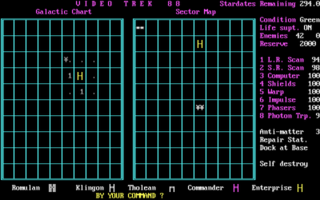 W
WVideo Trek 88 is a computer game developed and published by Windmill Software in 1982, based on the earlier Star Trek text game. As opposed to the mainframe version, both the galactic chart and the local map are displayed side by side.